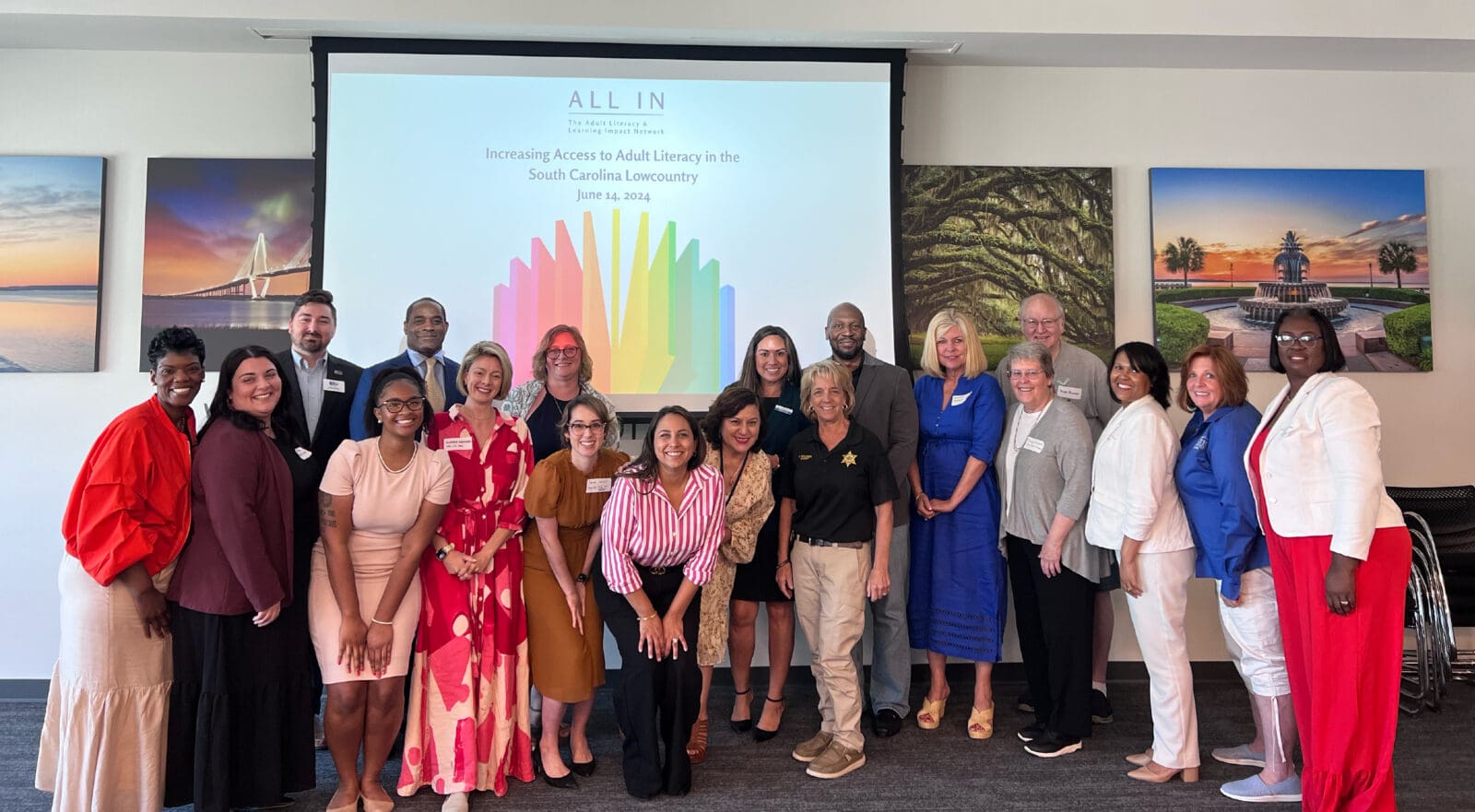
Launching a Literacy Asset Map in Charleston, South Carolina: A New Chapter for Community Growth
By Andri Moloney-Kitts
Literacy—the ability to read, write, speak, listen, use technology, and apply numeracy—is linked to sustained income growth, better healthcare access, improved job prospects for returning citizens, and stronger language skills among children. But in South Carolina, one out of five adults (about 22%) need foundational literacy skills support.
Members of the Adult Literacy and Learning Impact Network (ALL IN) have teamed up with key stakeholders across the Lowcountry, including education and workforce training institutions, libraries, employers, government leaders, law enforcement agencies, corrections, and community-based organizations, to drive economic and social mobility by co-designing a cross-sector model for increasing literacy skills. We mapped multiple literacy access points in Berkeley, Charleston, and Dorchester counties to identify the existing education programs and services. This map reveals potential gaps and strengthens partnerships to advance literacy access and learning opportunities across the community.
The South Carolina Lowcountry is a region that thrives on its sense of community and collaboration. However, there is inequitable access to literacy resources and services among residents, due to long-standing social, cultural, and historical factors. Various factors, including socioeconomic and racial disparities, geographical barriers, transportation limitations, and the stigma associated with low literacy, have resulted in limited access to and use of essential literacy services.

About the Tri-County Literacy Services and Supports Map
The Tri-County Literacy Services and Supports Map is a digital, interactive, and detailed inventory of literacy-related resources and services available in the Lowcountry community. Through this map, providers can access descriptive information about other organizations or services in the community. Key details include physical location and contact information, population served, cost, program length, and areas of focus. Users can explore services geographically with the ability to filter out organizations based on diverse learner needs.
Beyond program offerings, we asked program leaders to identify their organizational strengths and challenges in the local literacy ecosystem, and designed a chart to help providers identify potential opportunities for partnership. For example, health literacy was identified as a high-need area for multiple organizations. This map serves as a valuable tool for direct service providers such as social workers, parole officers, and/or library staff to make warm referrals to literacy services. It may also be used by adult learning providers and/or teachers exploring opportunities for partnership, and policymakers and funders looking to understand and address educational gaps in the region.
Features of The Tri-County Literacy Services and Supports Map
This map is designed to be user-friendly and accessible to multiple audiences, especially direct service providers for adults and families in the Lowcountry region. Key features include:
- Interactive Interface: Users can see services listed out and on a geographical map. For example, if a provider at SC Works recognizes that their client is struggling to read materials or complete a job application, they could identify literacy service providers in the area and make a warm referral (connect their client directly to the agency).
- Comprehensive Listings: The map includes detailed information about each service/organization such as program offerings, contact details, collaborative organizations, learner populations, and more.
- Filtering Options: To help users find exactly what they need, the map offers filters for different criteria, including program type, modalities, learner population, and wraparound services.
- Regular Updates: To ensure information remains current, the map will be updated regularly. Community organizations are encouraged to submit updates or upload new information via this link.
The map aims to close gaps by providing centralized, easy-to-use, online resources. By mapping out the current available literacy hubs, residents, educators, and community organizers can connect more efficiently, increasing adult literacy throughout the region.
Benefits to the Lowcountry Region
The Literacy Asset Map is more than just a directory; it is a tool for community empowerment via:
- Increased Access: By having information on literacy services available in one place, individuals can more easily find and access the resources they need. This is incredibly valuable for underserved communities, particularly those individuals with limited access to literacy resources.
- Enhanced Collaboration: This tool will foster collaboration among local organizations by providing visibility into available resources and partnerships. Coordination is seamless and encouraged, leading to more effective and comprehensive support.
- Informed Decision-Making: Educators, families, community leaders, and funders can use the map to make informed decisions about where to direct their efforts and resources, thus leading to more targeted interventions and strategic planning.
- Community Engagement: By involving local stakeholders in the mapping process and encouraging ongoing contributions, this project engages the community. As such, this collaborative approach ensures the map accurately reflects the needs and resources of the South Carolina Lowcountry.
Looking Ahead
As the Lowcountry region continues to grow and evolve, this map will play a crucial role in ensuring all residents have the tools and support they need to succeed. By fostering greater access to literacy resources, this map helps pave the way for a more informed, connected, and empowered community. For more information about our collective impact efforts in the Lowcountry community, including plans to replicate an economic impact study and conduct learner-centered qualitative research in the region, click here.

